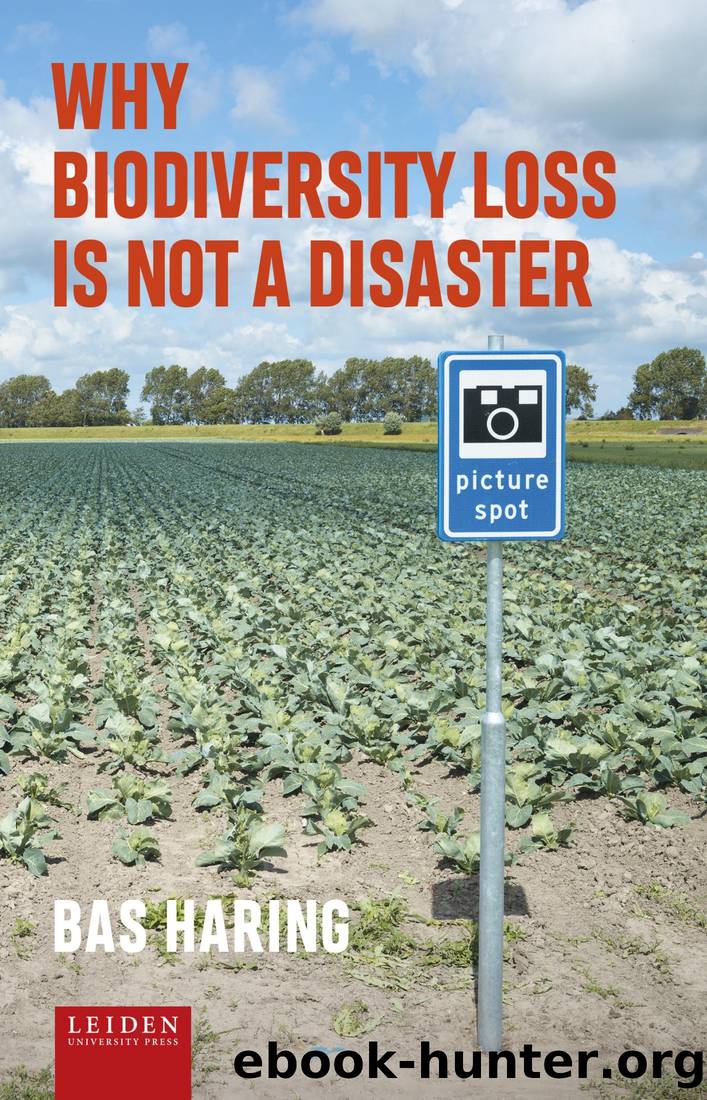Why biodiversity loss is not a disaster by Haring Bas;

Author:Haring, Bas; [Haring, Bas;]
Language: eng
Format: epub
ISBN: 9789087283537
Publisher: LeidenUP
Published: 2020-11-24T12:17:43+00:00
3.2 Human Suffering
Besides animals, we too could possibly suffer as a consequence of biodiversity loss. Nature provides us with all kinds of goods and servicesâfood, pollination, building materials, air purification, medicine, recreation, and so forth. Maybe the quality and quantity of these goods and services deteriorate because of natureâs decline.
In the introduction to this essay I quoted the United Nations:
Biodiversity is humanityâs source for countless irreplaceable goods and services, including food, lumber, medicine, crop pollination and air and water purification.
If we indeed owe our health, food, and water to biodiversity, then the loss of diversity will definitely make us suffer. Before I discuss some examples in more detail, specifically food, pollination, and medicines, I want to give some general comments on the idea that biodiversity is good for all kinds of practicalities.
There are plenty of scientific articles claiming a positive effect of biodiversity on some ecosystem good or service, with titles like âBiodiversity improves water quality â¦â (Cardinale, 2011); âBiodiversity decreases diseaseâ¦â (Johnson, Preston, Hoverman, & Richgels, 2013); âBiodiversity promotes primary productivityâ¦â (Oehri, Schmid, Schaepman-Strub, & Niklaus, 2017). And it seems logical that arguments like âbiodiversity is good for this and good for thatâ plead for biodiversity. However, âbiodiversity is good for X,â only argues for biodiversity if:
(1) X is desirable at all;
(2) biodiversity is better for achieving X than alternatives are;
(3) the âgoodsâ of biodiversity for X outweigh the âbads.â
Some examples to illustrate these points (with numbers that correspond to the numbers above):
(1) Biodiversity is good for recreation, they say. See e.g. Larsen et al. (2008) and Rees et al. (2010). But if there are plenty of ways to recreate, and there is a demand for e.g. food, this is hardly an argument for biodiversity anymore.
(2) It might very well be so that biodiversity has a positive effect on erosion prevention. (How that might be the case, I leave aside.) But if one specific kind of shrubbery has an even larger effect, the argument for biodiversity disappears, or at least is weakened.
(3) Biodiversity might be good for our health in various ways, but such positive effects should be weighed against the negatives. Diseases like malaria, dengue, and yellow fever are also âproducts of biodiversity.â30 Potential medicines should always be tested for (negative) side effects. But for biodiversity this never happens. I have tried seriously, but I have not found a single study of the side effects of biodiversity, for whichever application. Apparently, science has a rather positive bias with regard to biodiversity.
Often, it seems, the above constraints are too easily neglected, and it is believed that to make a case for biodiversity, it is enough to state that biodiversity is good for this or that. But that is an error of reasoning. Only if biodiversity is good for this or that, and this or that is desirable at all, and better than the alternatives, and the pros outweigh the cons, is a proper case made.
Furthermore, a positive correlation of biodiversity and some ecosystem good or service, doesnât necessarily mean that the positive effect is caused by biodiversity.
Download
This site does not store any files on its server. We only index and link to content provided by other sites. Please contact the content providers to delete copyright contents if any and email us, we'll remove relevant links or contents immediately.
How to Do Nothing by Jenny Odell(3101)
A Forest Journey by John Perlin(2912)
The Plant Messiah by Carlos Magdalena(2745)
Babylon's Ark by Lawrence Anthony(2427)
The ESV Study Bible by Crossway Bibles(2410)
Energy Myths and Realities by Vaclav Smil(2379)
Fatal Storm by Rob Mundle(2079)
Abbey in America by Murray John A(2013)
Witness Tree by Lynda V. Mapes(1859)
Brokeback Mountain by Annie Proulx(1715)
Client Earth by James Thornton(1698)
Shadows on the Gulf by Rowan Jacobsen(1688)
Coming Back to Life by Joanna Macy(1655)
Cosmos by Carl Sagan(1640)
Water Rights and the Environment in the United States by John Burch(1607)
Mycelium Running: How Mushrooms Can Help Save the World by Paul Stamets(1575)
Ten Billion by Stephen Emmott(1573)
The overachievers by Robbins Alexandra(1486)
The Uninhabitable Earth by David Wallace-Wells;(1402)
